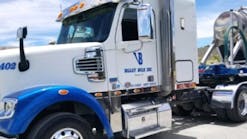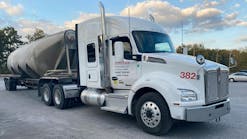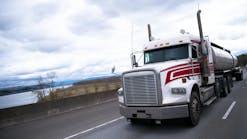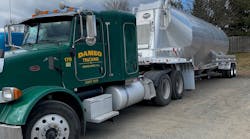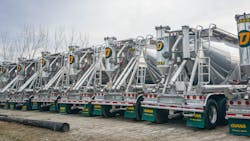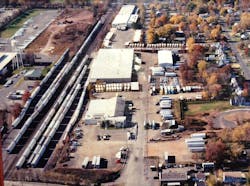Dana Companies is growing as a full-service provider to the plastics industry in the Northeast.
The family of companies owned by Ron Dana recently acquired Dameo Trucking and Dameo Regional Distribution Center in Bridgewater, New Jersey, adding a rail yard, two warehouse facilities, six drivers, and 20 pneumatic trailers to Dana’s dry bulk operation.
The 28-acre site includes a trucking terminal, 200 railcar spots, and more than 150,000 sq. ft. for warehousing and packaging.
Terms of the deal, which closed Aug. 16, were not disclosed.
“What made this really attractive is Dana has an operation in Oxford, Massachusetts, on rail, with 100,000 sq. ft. for warehouse and packaging, as well,” Dennis Lawless, director of dry bulk operations at Dana, told Bulk transporter. “And because we have a corporate office in Avenel, New Jersey, we already had a dozen drivers hauling in the region, so this gives us great support and helps us grow our capabilities.”
The Dameo Companies were co-owned by brothers Rocque, Rand, and Jason Dameo, the third generation of Dameos to operate the business started by their grandfather, Rocco Dameo, in 1936. Their father, also Rocque Dameo—whose name has adorned American Trucking Associations’ top state VP award since his death in 2014—ran the company from 1958 to 1998, when his namesake stepped in as president.
Rocque, now 63, said he plans to stay on through the transition.
“I’ve been doing this for 43 years, and my brothers are a little younger, but we have no kids in the business and we finally got to a point where we wanted to find someone as similar to us, as a family business, as possible,” Rocque said.
“I’ve known Ron Dana for 15-20 years, and he’s always had an interest, but I was never ready to get out. But the more I looked at it, with no kids coming in, the more I started to listen, and we came to an agreement.
“Now Dana will continue the legacy.”
Ownership matters
The man he sold to, Ron Dana, is 73—but remains heavily involved in every aspect of the massive operation, said Gene Patten, vice president of safety and compliance at Dana, who helped subsidiary Suttles Truck Leasing win a Heil Trophy last year.
That hands-on approach was important to Rocque, who wanted to sell the company to someone who would preserve Dameo’s small-business feel, even as its network vastly expanded. “I didn’t want private equity,” he said.
“I wanted someone who cares more about the customer than the balance sheet.”
See also: Suttles stays safe with ‘top-down’ tenacity
Plastic manufacturers are expressing similar sentiments, sparking the recent growth in Dana’s dry bulk operation, Lawless asserted. “It’s growing fast,” he said. “There’s a trend out there where the customers want service, and that’s sometimes difficult to deliver when you’re run by private equity. You’re looking at the balance sheet trying to figure out how to make things look a certain way before you flip it again, versus Ron Dana’s way of just taking care of the customer. So we have several majors wanting to grow with us.”
The problem with private-equity-backed businesses, he explained, is that their missions continually change with ownership. They’ll reduce equipment expenditures close to a sale, which strains operations and hurts the customer; pursue every available load after a sale, even ones they can’t handle, leading to dropped loads; or try to grow too fast through acquisitions and lose control—again harming the customer.
Ron Dana’s old-school approach hasn’t changed in more than 50 years as owner and president.
“He prides himself on servicing the industry,” Lawless said.
“His mission statement since Day 1 has been to build a company the industry needs. And that’s a staggering mission because they need you to be safe, they need you to be profitable, they need you to have capacity, and they need you to grow with them. That’s no small undertaking when you’re talking about serving the chemical industry because you’re looking at every possible liquid that moves through the country, and plastic resin is a huge part of the industry, too—and the network he’s built (with 70 terminals) is second to none.
“It’s quite an amazing puzzle he’s put together.”
Bulking up
Driver and equipment constraints didn’t prompt the acquisition, Lawless insisted, saying they’ve hired 25 drivers this year in Oxford alone.
“We’ve had great success at hiring drivers in this market,” he said.
Dana’s dry bulk truck fleet now boasts more than 200 trailers—in addition to its 4,000-plus liquid tankers on the road. That doesn’t include the equally extensive lease fleet in its International Equipment Logistics division. Lawless says their dry bulk fleet isn’t the largest in the country but is the most modern, with 70 new pneumatic trailers deployed in the last five years, 30 new trailers in inventory, and another 60 on order—all of them J&L Tank trailers. “Nobody even comes close to putting that much new equipment out on the road,” he said.
The dry bulk business also now includes a 100-acre terminal in St. Louis, Missouri, dedicated to the plastics industry, with warehousing, packaging and rail access; a similar setup in Kansas City, Kansas; hubs in Charlotte, North Carolina; Ashland, Kentucky; Columbus, Ohio; Oxford and now Bridgewater; and several satellite operations.
“We’re moving fast in a forward direction,” Lawless summarized.
In good hands
Lawless is leading the Dameo integration.
The company was outsourcing the loads of polypropylene, polyethylene, and other plastic resins it couldn’t handle before the acquisition, so Dana began covering those loads with additional trucks on Day 1, he said. Most of the “meat and potatoes” of the operation, including billing and payroll, already transitioned, and now they’re adding modern equipment, updating the facility, and bringing new employees up to speed.
Rocque and, to a lesser extent, his brothers are sticking around during the process.
Their grandfather started by hauling freight for the U.S. Army and weapons for the U.S. Navy during Word War II; grew after the war as a contract carrier for manufacturer Johns Manville, in Manville, New Jersey, for 50 years; and entered the plastics industry in 1968 with Northern Petrochemical, in Morris, Illinois, which today is part of LyondellBasell.
Given all of that history, he says he’s unwilling to walk away until he can drive by the facility the day before he dies and feel good—and reminisce with pride when he reunites with his dad and grandfather on the other side.
“When I’m certain it’s in good shape and running fine, that’s when I’ll transition out,” he said.




